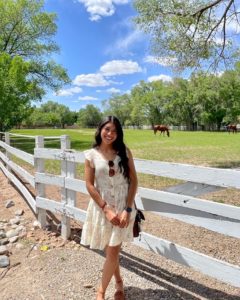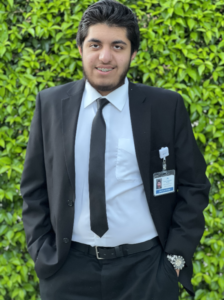Hear from the amazing students that make up our FACES programs!
Bobby & Deanna
Cesiah Gonzalez
 “My name is Cesiah Gonzalez, a FACES PHYC student in Albuquerque, New Mexico. I think it is important for teens to be public health advocates in their communities because, I believe it gives a new and fresh perspective to members our age and even older generations.
“My name is Cesiah Gonzalez, a FACES PHYC student in Albuquerque, New Mexico. I think it is important for teens to be public health advocates in their communities because, I believe it gives a new and fresh perspective to members our age and even older generations.
A time when I changed someone’s mind about COVID-19 vaccine was when I, along with other family members, convinced my grandparents to get vaccinated against COVID. The role I played was sharing my knowledge on what the vaccine does in our bodies which I learned through FACES. It was really important for us to get them to understand the facts rather than just speculations being shared on the news and such at the time.
A piece of advice I would give health officials about how to get information to people in my community is to use people who can relate with the desired audience. For example: if the desired audience is a group of teens, use teens of the same age range to share the information. Or most used social media platforms, such as lnstagram, Snapchat, etc.
Being a part of FACES has given me one of the most important learning experiences of my life. It gave me a real perspective of what it is like working in an ER through my internship placement. Because of FACES I discovered that being a trauma Nurse at an emergency room is what I want to do after high school.”
Zeeshawn Mahmood Khan

“One piece of advice I would give to public health officials is that culturally competent communication matters. What I mean by that is in order to effectively communicate to a community, public health officials should first understand their target community’s culture, traditions, norms, religious values (if necessary), and most importantly, language. For example, the reason why most of the East Asian and Middle Eastern Muslim community (which I am a part of) got vaccinated is largely due to the efforts of UC Davis Health’s Shifa Clinic. Shifa Clinic had multiple weekend pop-up vaccine clinics in the basement of the Muslim Mosque Association Mosque, and the Imam of the Mosque always announced the date and times of the vaccine clinics during Friday Prayer where around 300 worshippers would show up. News would spread rapidly among families and elders, Muslims from all over Sacramento and nearby came to Shifa Clinic to get their vaccines. Even two weeks ago there was a pop-up vaccine clinic and a long line of people. I’ve seen first hand how community-targeted health measures work, and in fact works way more effectively than general health measures. UC Davis’s Shifa Clinic and their success which I have seen through my own eyes is a perfect example of how cultural competence, and understanding the language and norms of a community is key to effective public health.”